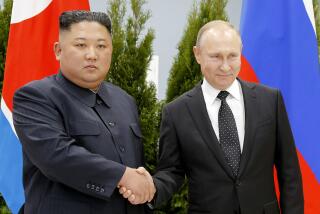He Should Talk
- Share via
The reasons for the Soviet Union’s seeming derailment last Friday of prospects for an early summit meeting are still not clear. But, whatever the explanation, the Kremlin has had second thoughts. Foreign Minister Eduard A. Shevardnadze’s hastily arranged trip to Washington is expected to result in the scheduling of a meeting between President Reagan and Soviet leader Mikhail S. Gorbachev--possibly before the end of this year.
The prospective summit meeting would provide the occasion for the signing of an agreement to eliminate medium-range missiles--those with a reach of 300 to 3,000 miles. Most such missiles are in Europe.
Moscow’s change of heart is a welcome development. However, the Reagan Administration should not bow to reported Soviet desires to hold the meeting in a third country. It should be held in Washington or not at all.
It’s worth keeping in mind that summit meetings in any event are not ends in themselves, or at least they shouldn’t be. The most important task at the moment is to produce a U.S.-Soviet agreement concerning deep reductions in the strategic-nuclear-missile forces on both sides. Without a strategic-arms agreement, the Euromissile agreement could merely lead to a Soviet deployment of additional long-range missiles, which are not covered by the prospective Euromissile treaty. Some of these intercontinental-range missiles could be targeted on Western Europe.
The two superpowers have made considerable strides toward agreement on deep cuts in strategic offensive missiles. But the Soviets have insisted that such reductions must be accompanied by restraints on the development and deployment of anti-missile defense systems.
Gorbachev does not appear to have retreated on that basic stand. But Soviet officials now say that the absence of agreement on this point is not a barrier to a summit meeting, provided that Reagan will at least agree to a full summit discussion of the strategic-defense question. If that is the case, there is no reason for the President to say no.
By now it is obvious that members of Congress are not willing to vote the kind of money that Reagan wants in order to pursue his “Star Wars” program. Even if they were, experts say that an agreement setting forth the parameters between allowable and non-allowable testing and development would not interfere with the U.S. program until well into the 1990s.
Formalizing the obvious should be a small price to pay, even from Reagan’s point of view, if it makes possible an agreement on deep cuts in offensive weapons that is very much in the American interest.
At the very least the President, who is beleaguered on several other fronts, should be willing to talk about the question at a summit meeting that just happens to serve his political interests as well as the national security of the United States.
More to Read
Sign up for Essential California
The most important California stories and recommendations in your inbox every morning.
You may occasionally receive promotional content from the Los Angeles Times.













